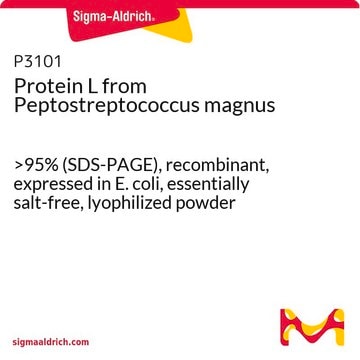66886-U
Empore™ SPE Disks
SDB-RPS, diam. 47 mm, pk of 20
Synonym(s):
polymeric reverse phase w/Strong Cation Exchange, SPE disk, 47 mm
About This Item
Recommended Products
product name
Empore™ SPE Disks, matrix active group SDB-RPS, diam. 47 mm, pk of 20
description
polystyrene-divinylbenzene, reversed-phase sulfonate
product line
Empore™
packaging
pk of 20
manufacturer/tradename
CDS Analytical 98-0604-0226-4
technique(s)
solid phase extraction (SPE): suitable
diam.
47 mm
membrane thickness
0.5 mm
surface area
450 m2/g
matrix active group
SDB-RPS
particle size
12 μm (spherical)
12 μm
pore size
80 Å pore size
Looking for similar products? Visit Product Comparison Guide
Related Categories
General description
The Empore line of SPE disks comprises of the most complete line of SPE disks for extracting large volumes of aqueous samples. The product line ranges from time-tested C18 to unique phase chemistries such as carbon and the highly polar Oil & Grease disk. The disks are ideal for environmental analysis where 1 L sample volumes are not uncommon and provide an efficient alternative to LLE.
Save Time & Money:
- Reduced SPE Bed Mass = Reduced SPE Solvent & Elution Volumes
- Minimize SPE eluate evaporation time
- Potentially allows for direct injection of the SPE eluate
- Dense & Uniform Extraction Medium = No SPE Channeling and Voiding
- Efficient mass-transfer kinetics allow for faster flow rates
- Eliminate SPE fines improving column and instrument life
Application
- Determination of diphenylarsinic acid, phenylarsonic acid and inorganic arsenic in drinking water: This study utilizes Empore SPE Disks for the simultaneous separation and preconcentration of toxic compounds in drinking water, highlighting the disks′ application in environmental safety and public health (Hagiwara et al., 2013).
- Monitoring of ecotoxicological hazard potential by polar organic micropollutants: The research emphasizes the utility of SPE disks in the environmental monitoring of micropollutants, contributing significantly to the assessment of water quality and ecological risks (Escher et al., 2008).
- Determination of commonly used polar herbicides in agricultural drainage waters: Demonstrates the efficiency of SPE Disks in analyzing herbicide residues in agricultural runoff, providing insights into pollution control and chemical residue management (Tran et al., 2007).
- Stability of pesticides on solid-phase extraction disks: Explores the stability of various pesticides on SPE disks under different conditions, proving the disks′ reliability for sample storage and analysis in multi-environmental studies (Cobb et al., 2006).
Other Notes
- Explosive residues (HDX, RDX)
Legal Information
Disclaimer
Choose from one of the most recent versions:
Certificates of Analysis (COA)
Sorry, we don't have COAs for this product available online at this time.
If you need assistance, please contact Customer Support.
Already Own This Product?
Find documentation for the products that you have recently purchased in the Document Library.
Customers Also Viewed
Our team of scientists has experience in all areas of research including Life Science, Material Science, Chemical Synthesis, Chromatography, Analytical and many others.
Contact Technical Service










